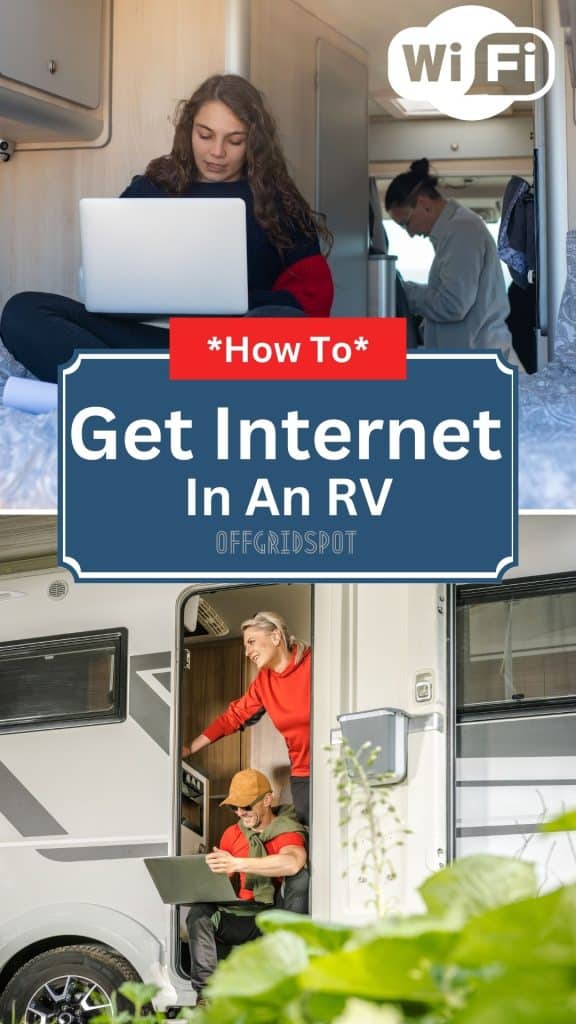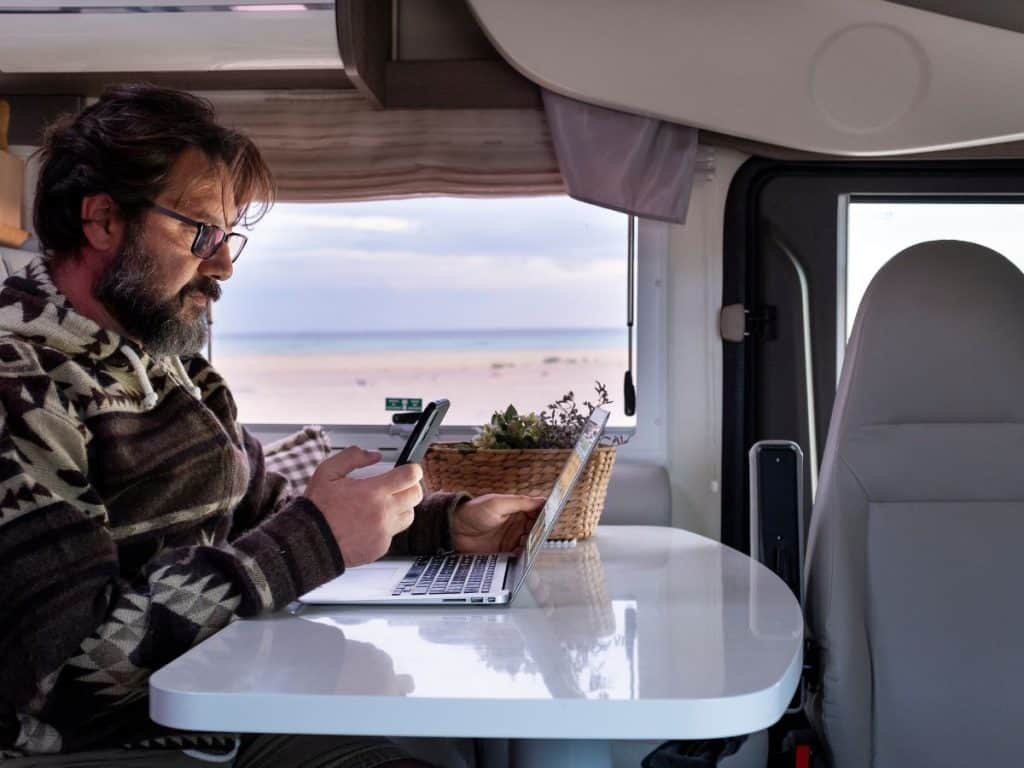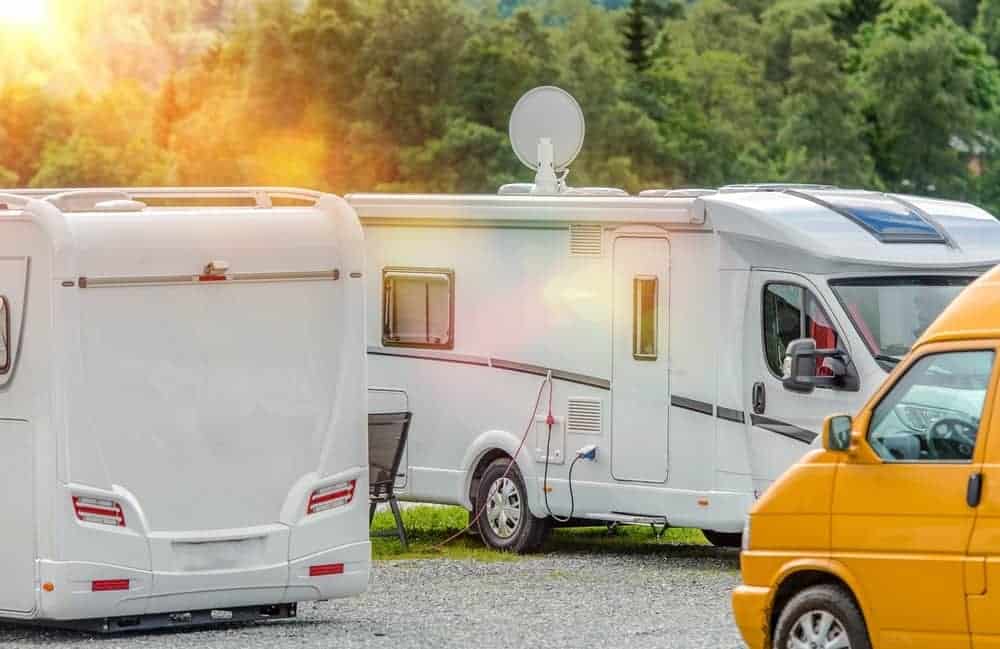For many people, RVing is a way of life. It’s a lifestyle that allows them to travel the country and experience new adventures while still having the comforts of home. However, staying connected to the internet while on the road can be a challenge. Fortunately, there are several ways to get internet in an RV that will keep you connected no matter where you are.
One of the easiest and cheapest ways to get internet in an RV is to rely on free Wi-Fi hotspots. Many coffee shops, restaurants, and even some campgrounds offer free Wi-Fi that you can use to connect to the internet. However, this solution is not always reliable, and the signal strength can vary depending on your location. For those who need a more dependable connection, there are other options available.

Another option for getting internet in an RV is to use a mobile hotspot device. This is a device that allows you to connect to a cellular network and create a Wi-Fi network that you can use to connect your devices. Mobile hotspots are available from most major cellular providers, and they offer a reliable connection that can be used anywhere there is cellular coverage. However, it’s important to keep in mind that using a mobile hotspot can quickly eat up your data plan, so it’s important to choose a plan that offers enough data for your needs.
Understanding Your RV Internet Options
When it comes to getting internet in an RV, there are a few different options available. Each option has its own pros and cons, so it’s important to understand what’s available before making a decision. Here are the three main options:
Satellite Internet
Satellite internet is a great option for RVers who like to travel off the beaten path. Because the signal is beamed down from a satellite in space, it can be accessed from just about anywhere. However, satellite internet can be expensive and slow compared to other options. It also requires a clear view of the southern sky, which can be a challenge in some locations.
Mobile Hotspots
Mobile hotspots are another popular option for RVers. They work by using a cellular signal to create a Wi-Fi network that can be accessed by multiple devices. This option is often cheaper and faster than satellite internet, but it is limited by the strength of the cellular signal in a given area. If you plan on using a mobile hotspot, it’s important to check coverage maps to make sure you’ll have a strong signal where you plan to travel.
Antennas
Antennas are a great option for RVers who want to boost their signal strength without paying for an expensive satellite or cellular plan. There are a variety of antennas available, from simple indoor antennas to more complex outdoor models. An antenna can help you pick up local Wi-Fi signals and boost your cellular signal strength, making it easier to stay connected while on the road.
It’s important to note that these options are not mutually exclusive. Many RVers choose to use a combination of satellite internet, mobile hotspots, and antennas to ensure they have a reliable internet connection no matter where they travel.
Choosing the Right Internet Plan

When it comes to choosing the right internet plan for your RV, there are several factors to consider, including coverage, data limits, and cost. Here are some options to consider:
AT&T
AT&T offers several plans that may be suitable for RVers, including their Mobile Share Plus plan that allows you to share data across multiple devices. They also offer a standalone mobile hotspot plan that offers up to 100GB of data per month. AT&T has a broad coverage area and is a good choice for those who travel to remote locations.
T-Mobile
T-Mobile offers a variety of plans, including their Magenta plan, which includes unlimited data, text, and calls. They also offer a standalone mobile hotspot plan that offers up to 100GB of data per month. T-Mobile’s coverage area is not as broad as AT&T’s, but they do offer unlimited data plans that may be a good option for those who use a lot of data.
Unlimited Plans
Unlimited data plans are a popular choice for RVers because they offer the freedom to use as much data as you need without worrying about overage charges. However, it’s important to note that some plans may have data throttling after a certain amount of usage, which can slow down your internet speed. Make sure to read the fine print and understand the terms and conditions of any unlimited plan you are considering.
In addition to AT&T and T-Mobile, there are other providers that offer unlimited plans, such as Verizon and Sprint. It’s important to research and compare plans to find the best option for your needs.
When choosing an internet plan for your RV, it’s important to consider your usage habits, coverage area, and budget. With the right plan, you can stay connected and enjoy all the benefits of life on the road.
Boosting Your Signal
When it comes to getting internet in an RV, sometimes the signal can be weak or nonexistent. Fortunately, there are several ways to boost your signal and improve your internet connection.
Wi-Fi Extenders
A Wi-Fi extender is a device that picks up the existing Wi-Fi signal and amplifies it, extending the range and strength of the signal. This can be especially helpful when you’re parked at a campground or RV park that offers Wi-Fi but the signal is weak.
One popular Wi-Fi extender for RVers is the Winegard WF-4035 Black ODU Extender, which is known for its simple setup and reliability. It’s also weather-resistant, making it a good option for outdoor use.
Wi-Fi Boosters
A Wi-Fi booster, also known as a Wi-Fi amplifier, works similarly to a Wi-Fi extender but with a few key differences. A Wi-Fi booster amplifies the signal and rebroadcasts it, creating a new network that extends the range of the original signal.
The Bear Extender RV & Marine USB Outdoor WiFi Antenna is a popular Wi-Fi booster for RVers. It comes with a rubber duck antenna that can be mounted outside the RV for maximum signal strength.
Inseego 5G MiFi M2000
For those who need a stronger and more reliable internet connection, the Inseego 5G MiFi M2000 is a powerful option. This device uses 5G technology to provide high-speed internet wherever there is a 5G signal available.
The Inseego 5G MiFi M2000 can connect up to 30 devices at once, making it a good option for families or groups traveling in an RV. It also has a long battery life and can be used as a portable hotspot outside of the RV.
In conclusion, boosting your signal can greatly improve your internet connection while traveling in an RV. Whether you choose a Wi-Fi extender, Wi-Fi booster, or a device like the Inseego 5G MiFi M2000, there are options available to fit your needs and budget.
Staying Connected on the Go

When it comes to RVing, staying connected to the internet is crucial for work, entertainment, and communication. Luckily, there are several options available to ensure you have a reliable internet connection no matter where you go.
RV Parks
Many RV parks offer WiFi access to their guests. While this can be a convenient option, it’s important to keep in mind that the quality and speed of the connection can vary greatly. In some cases, the WiFi signal may not reach all areas of the park or may be slow due to high usage. Additionally, some RV parks may charge an additional fee for WiFi access.
Nationwide Coverage
For those who travel frequently or prefer to have a more reliable internet connection, a nationwide coverage plan may be the best option. These plans typically use cellular networks to provide internet access and can be used anywhere with a strong signal. Popular providers include Verizon, AT&T, and Sprint, among others. However, it’s important to note that these plans can be more expensive than other options and may have data usage limits.
Reliable Internet
If you need a reliable and fast internet connection for work or other important tasks, a satellite internet plan may be the best choice. These plans use a satellite dish to provide internet access and can be used anywhere with a clear view of the sky. While these plans can be more expensive than other options, they offer a more reliable connection and higher speeds.
No matter which option you choose, it’s important to do your research and choose a plan that fits your needs and budget. Additionally, it’s a good idea to have a backup plan in case your primary internet connection fails. This could include using public WiFi at a coffee shop or library, or having a mobile hotspot as a backup. With the right plan and backup options, you can stay connected on the go and enjoy all the benefits of RVing.
Streaming and Remote Work
When it comes to RV living, having reliable internet is essential for both streaming and remote work. In this section, we will discuss how to get internet in an RV for streaming and remote work purposes.
Streaming
Streaming is a popular pastime for many RVers, whether it’s watching Netflix or YouTube. To ensure a smooth streaming experience, it’s important to have a stable and fast internet connection. Here are some options for streaming in an RV:
- Satellite Internet: If you’re traveling in remote areas with limited cellular coverage, satellite internet may be your best option. While it can be more expensive than other options, it provides reliable internet access in areas where other options may not be available.
- Cellular Hotspots: Many RVers use cellular hotspots to get internet access on the road. These devices use cellular networks to provide internet access, and they can be a good option if you’re traveling in areas with good cellular coverage.
- WiFi Extenders: If you’re staying in an RV park or campground with WiFi, a WiFi extender can help boost the signal and provide a more reliable connection.
Remote Work
For those who work remotely, having a reliable internet connection is crucial. Here are some options for getting internet in an RV for remote work:
- Cellular Hotspots: As mentioned earlier, cellular hotspots can be a good option for getting internet access on the road. However, it’s important to note that some cellular plans have data caps and may slow down speeds after a certain amount of data is used.
- Satellite Internet: While satellite internet can be more expensive than other options, it provides reliable internet access in areas where other options may not be available. This can be particularly important for remote workers who need a stable connection to get their work done.
- WiFi Extenders: If you’re staying in an RV park or campground with WiFi, a WiFi extender can help boost the signal and provide a more reliable connection for remote work.
Overall, there are several options for getting internet in an RV for streaming and remote work purposes. It’s important to consider your specific needs and travel plans when choosing an internet solution for your RV.
Exploring Other Internet Options
While cellular data plans and RV park WiFi are popular options for getting internet in an RV, there are other alternatives that are worth considering. In this section, we will explore two other options: Nomad Internet and Starlink Roam.
Nomad Internet
Nomad Internet is a mobile internet service provider that offers unlimited high-speed data plans. They use a combination of cellular networks and satellite technology to provide coverage across the United States. Nomad Internet plans are ideal for RVers who need reliable internet connectivity for work or entertainment.
One of the advantages of Nomad Internet is that they offer plans with no contracts or data caps. They also provide a 14-day trial period, so RVers can test their service before committing to a plan. Nomad Internet’s plans start at $129 per month, which may be more expensive than other options, but it includes unlimited data and high-speed connectivity.
Starlink Roam
Starlink Roam is a new service from SpaceX that provides satellite internet for RVers. The service is currently in beta testing, but it promises to offer high-speed internet connectivity anywhere in the United States. Starlink Roam uses the same technology as SpaceX’s Starlink satellite internet service, which has received positive reviews from early adopters.
One of the advantages of Starlink Roam is that it does not require a contract or installation fees. RVers can purchase the Starlink Kit, which includes a satellite dish and modem, for $499. The monthly service fee is $99, which includes unlimited data and high-speed connectivity. Starlink Roam is still in beta testing, so it may not be available in all areas.
Summing it Up
While cellular data and RV park WiFi are popular options for getting internet in an RV, Nomad Internet and Starlink Roam are two other alternatives that are worth considering. Nomad Internet offers unlimited high-speed data plans with no contracts or data caps, while Starlink Roam promises to provide high-speed internet connectivity anywhere in the United States using satellite technology. RVers should consider their internet needs and budget when choosing the best option for them.
Conclusion
Getting internet in an RV can be a challenge, but there are several options available to RVers. Depending on your needs, budget, and location, you can choose from a variety of options, including phone hotspots, hotspot packs, mobile satellite internet, and cellphone hotspots.
For those who have a reliable cell signal, a phone hotspot or a hotspot pack can be a cost-effective solution. These devices allow you to connect multiple devices to the internet using your phone’s data plan. However, keep in mind that data usage can add up quickly, so it’s important to monitor your usage and choose a plan that fits your needs.
If you need more data or have limited cell coverage, mobile satellite internet may be a better option. While this can be more expensive than other options, it provides reliable internet access no matter where you are. Keep in mind, however, that satellite internet can be slower and may have data caps.
Cellphone hotspots are another option for RVers. These devices allow you to connect to the internet using your cellphone’s data plan. However, like phone hotspots, data usage can add up quickly, so it’s important to monitor your usage and choose a plan that fits your needs.
In conclusion, there are several options available for RVers looking to get internet on the road. It’s important to weigh the pros and cons of each option and choose the one that best fits your needs and budget. With the right solution, you can stay connected and enjoy all the benefits of RV living.
Also Read:
- 10 Best Pop-Top Camper Vans: Top Picks for Comfortable and Convenient Travel - November 6, 2023
- High Living: Discovering Stunning Tree Houses Around the World - October 9, 2023
- 10+ Ingenious Shuttle Bus Conversions (+Important Certification Requirements) - September 27, 2023